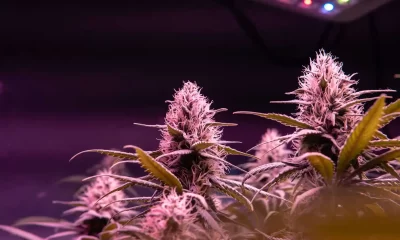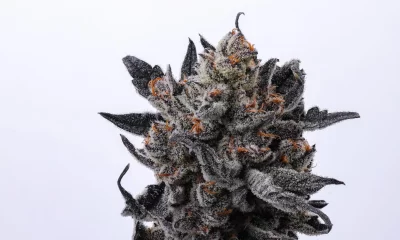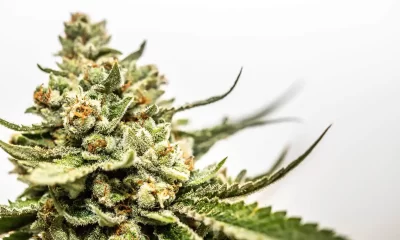Government
House Panel Approves Amendment to Protect State Legal Cannabis Programs

A House legislative panel has approved an amendment to a budget bill that prohibits the federal government from interfering with adult-use cannabis programs legal under state law.
The House Appropriations Committee approved a legislative amendment on Tuesday that would protect businesses and individuals participating in recreational cannabis programs legal under state law from interference and prosecution by the federal government. The amendment, which attaches a budget rider to the 2023 Commerce, Justice, Science and Related Agencies appropriations legislation, was approved by a voice vote before the committee passed the entire bill by a vote of 31-24.
The bipartisan amendment was introduced by Democratic Representative Barbara Lee of California and Representative David Joyce, a Republican from Ohio. The legislation is also supported by congressional cannabis advocates who do not sit on the Appropriations Committee including Representative Earl Blumenauer of Oregon and District of Columbia Representative Eleanor Holmes Norton, both Democrats, as well as Republican Representative Tom McClintock of California.
No Federal Funds for Weed Prosecutions
Under the budget rider, the Department of Justice is prohibited from using federal resources to interfere with the authority of states, territories, tribal governments, or the District of Columbia to enact legislation to regulate the production, sale and use of cannabis. The legislation passed by the House also prohibits the government from taking action against adults who are acting in compliance with adult-use cannabis programs legal under state, tribal or territorial law.
“Congress must honor the will of the voters and prevent wasteful Department of Justice prosecution of those complying with their respective state’s or tribe’s cannabis regulations,” Blumenauer said in a statement. “I have spearheaded the work to develop this language, which protects the state and tribal-legal programs that have been enacted laws to end prohibitionary policies and allow the development of both adult-use and medical marijuana programs.”
Similar amendments have been approved by the full House of Representatives as part of omnibus appropriations legislation over the last two years but they were not included in the final version of the bills. Since 2014, Congress has passed appropriations bills that included protections for those acting in compliance with state-legal medical cannabis laws.
In 2018, former Attorney General Jeff Sessions rescinded the Cole Memo, which since 2013 had directed the Department of Justice to assign a low priority to prosecutions for cannabis offenses legal under state law. Current Attorney General Merrick Garland has repeatedly said that enforcing marijuana prohibition laws are generally not an effective use of federal resources, although prosecutions continue in many jurisdictions.
Morgan Fox, the political director of the National Organization for the Reform of Marijuana Laws (NORML), applauded the passage of the amendment in a statement from the cannabis policy reform advocacy group.
“As federal lawmakers steadily work to determine the best way to finally end marijuana prohibition and undo the damage it has caused, the people involved in regulated cannabis programs in the growing number of states that are leading the way on this issue deserve to know whether the federal government will actively get in the way of their continued successes,” said Fox. “Including these protections in the federal budget will go a long way toward giving individuals, businesses, and state governments some peace of mind while signaling to the vast majority of Americans who support legalizing and regulating cannabis that their elected representatives are actually listening to them.”
Cannabis Industry Reacts to House Vote
Reaction to the passage of the budget rider from representatives of the growing cannabis industry was mostly positive, although many experts noted that the legislation does not go far enough. Katrina Skinner, general counsel and chief banking officer at cannabis compliance platform Simplifya, said that while the amendment passed by the Appropriations Committee is a positive sign that some lawmakers are ready to make progress on policy reform, it does not have the force of comprehensive legislation to legalize cannabis nationwide. Skinner noted that previous legislation known as the Rohrabacher Farr amendment to protect state-legal medical cannabis programs was not applied consistently around the country.
“Although the House Bill is another symbolic step in the right direction for protecting state legal cannabis industries, it is unlikely to provide practical protections from federal law enforcement interference,” Skinner wrote in an email to High Times. “As we have seen before with the Rohrabacher Farr appropriations rider, federal law enforcement agencies have taken a narrow view about what constitutes ‘interference,’ and judicial decisions have differed by jurisdictions.”
“Finally, as worded, the bill does nothing to help protect interstate commerce rights for licensed operators, including transporting funds derived from legal sales across state lines so that the businesses can obtain limited banking services,” Skinner continued. “So long as marijuana remains illegal federally, federal law enforcement agencies have the right to investigate and prosecute violations related to the CSA.”
Christian Sederberg, founding partner of cannabis law firm Vicente Sederberg, said that the amendment will help protect cannabis policy reform at the state level.
“This measure reflects the increasingly popular opinion that the federal government has no business interfering in state cannabis programs,” Sederberg wrote in a statement to High Times. “As Congress works to find more comprehensive solutions to repealing federal prohibition, it is important that states continue to implement regulatory programs aimed at protecting public health and safety.”
Source: https://hightimes.com/news/house-panel-approves-amendment-to-protect-state-legal-cannabis-programs/
Business
New Mexico cannabis operator fined, loses license for alleged BioTrack fraud

New Mexico regulators fined a cannabis operator nearly $300,000 and revoked its license after the company allegedly created fake reports in the state’s traceability software.
The New Mexico Cannabis Control Division (CCD) accused marijuana manufacturer and retailer Golden Roots of 11 violations, according to Albuquerque Business First.
Golden Roots operates the The Cannabis Revolution Dispensary.
The majority of the violations are related to the Albuquerque company’s improper use of BioTrack, which has been New Mexico’s track-and-trace vendor since 2015.
The CCD alleges Golden Roots reported marijuana production only two months after it had received its vertically integrated license, according to Albuquerque Business First.
Because cannabis takes longer than two months to be cultivated, the CCD was suspicious of the report.
After inspecting the company’s premises, the CCD alleged Golden Roots reported cultivation, transportation and sales in BioTrack but wasn’t able to provide officers who inspected the site evidence that the operator was cultivating cannabis.
In April, the CCD revoked Golden Roots’ license and issued a $10,000 fine, according to the news outlet.
The company requested a hearing, which the regulator scheduled for Sept. 1.
At the hearing, the CCD testified that the company’s dried-cannabis weights in BioTrack were suspicious because they didn’t seem to accurately reflect how much weight marijuana loses as it dries.
Company employees also poorly accounted for why they were making adjustments in the system of up to 24 pounds of cannabis, making comments such as “bad” or “mistake” in the software, Albuquerque Business First reported.
Golden Roots was fined $298,972.05 – the amount regulators allege the company made selling products that weren’t properly accounted for in BioTrack.
The CCD has been cracking down on cannabis operators accused of selling products procured from out-of-state or not grown legally:
- Regulators alleged in August that Albuquerque dispensary Sawmill Sweet Leaf sold out-of-state products and didn’t have a license for extraction.
- Paradise Exotics Distro lost its license in July after regulators alleged the company sold products made in California.
Golden Roots was the first alleged rulebreaker in New Mexico to be asked to pay a large fine.
Source: https://mjbizdaily.com/new-mexico-cannabis-operator-fined-loses-license-for-alleged-biotrack-fraud/
Business
Marijuana companies suing US attorney general in federal prohibition challenge

Four marijuana companies, including a multistate operator, have filed a lawsuit against U.S. Attorney General Merrick Garland in which they allege the federal MJ prohibition under the Controlled Substances Act is no longer constitutional.
According to the complaint, filed Thursday in U.S. District Court in Massachusetts, retailer Canna Provisions, Treevit delivery service CEO Gyasi Sellers, cultivator Wiseacre Farm and MSO Verano Holdings Corp. are all harmed by “the federal government’s unconstitutional ban on cultivating, manufacturing, distributing, or possessing intrastate marijuana.”
Verano is headquartered in Chicago but has operations in Massachusetts; the other three operators are based in Massachusetts.
The lawsuit seeks a ruling that the “Controlled Substances Act is unconstitutional as applied to the intrastate cultivation, manufacture, possession, and distribution of marijuana pursuant to state law.”
The companies want the case to go before the U.S. Supreme Court.
They hired prominent law firm Boies Schiller Flexner to represent them.
The New York-based firm’s principal is David Boies, whose former clients include Microsoft, former presidential candidate Al Gore and Elizabeth Holmes’ disgraced startup Theranos.
Similar challenges to the federal Controlled Substances Act (CSA) have failed.
One such challenge led to a landmark Supreme Court decision in 2005.
In Gonzalez vs. Raich, the highest court in the United States ruled in a 6-3 decision that the commerce clause of the U.S. Constitution gave Congress the power to outlaw marijuana federally, even though state laws allow the cultivation and sale of cannabis.
In the 18 years since that ruling, 23 states and the District of Columbia have legalized adult-use marijuana and the federal government has allowed a multibillion-dollar cannabis industry to thrive.
Since both Congress and the U.S. Department of Justice, currently headed by Garland, have declined to intervene in state-licensed marijuana markets, the key facts that led to the Supreme Court’s 2005 ruling “no longer apply,” Boies said in a statement Thursday.
“The Supreme Court has since made clear that the federal government lacks the authority to regulate purely intrastate commerce,” Boies said.
“Moreover, the facts on which those precedents are based are no longer true.”
Verano President Darren Weiss said in a statement the company is “prepared to bring this case all the way to the Supreme Court in order to align federal law with how Congress has acted for years.”
While the Biden administration’s push to reschedule marijuana would help solve marijuana operators’ federal tax woes, neither rescheduling nor modest Congressional reforms such as the SAFER Banking Act “solve the fundamental issue,” Weiss added.
“The application of the CSA to lawful state-run cannabis business is an unconstitutional overreach on state sovereignty that has led to decades of harm, failed businesses, lost jobs, and unsafe working conditions.”
Business
Alabama to make another attempt Dec. 1 to award medical cannabis licenses

Alabama regulators are targeting Dec. 1 to award the first batch of medical cannabis business licenses after the agency’s first two attempts were scrapped because of scoring errors and litigation.
The first licenses will be awarded to individual cultivators, delivery providers, processors, dispensaries and state testing labs, according to the Alabama Medical Cannabis Commission (AMCC).
Then, on Dec. 12, the AMCC will award licenses for vertically integrated operations, a designation set primarily for multistate operators.
Licenses are expected to be handed out 28 days after they have been awarded, so MMJ production could begin in early January, according to the Alabama Daily News.
That means MMJ products could be available for patients around early March, an AMCC spokesperson told the media outlet.
Regulators initially awarded 21 business licenses in June, only to void them after applicants alleged inconsistencies with how the applications were scored.
Then, in August, the state awarded 24 different licenses – 19 went to June recipients – only to reverse themselves again and scratch those licenses after spurned applicants filed lawsuits.
A state judge dismissed a lawsuit filed by Chicago-based MSO Verano Holdings Corp., but another lawsuit is pending.
Source: https://mjbizdaily.com/alabama-plans-to-award-medical-cannabis-licenses-dec-1/
-

 Business2 years ago
Business2 years agoPot Odor Does Not Justify Probable Cause for Vehicle Searches, Minnesota Court Affirms
-

 Business2 years ago
Business2 years agoNew Mexico cannabis operator fined, loses license for alleged BioTrack fraud
-

 Business2 years ago
Business2 years agoAlabama to make another attempt Dec. 1 to award medical cannabis licenses
-

 Business2 years ago
Business2 years agoWashington State Pays Out $9.4 Million in Refunds Relating to Drug Convictions
-

 Business2 years ago
Business2 years agoMarijuana companies suing US attorney general in federal prohibition challenge
-

 Business2 years ago
Business2 years agoLegal Marijuana Handed A Nothing Burger From NY State
-

 Business2 years ago
Business2 years agoCan Cannabis Help Seasonal Depression
-

 Blogs2 years ago
Blogs2 years agoCannabis Art Is Flourishing On Etsy













